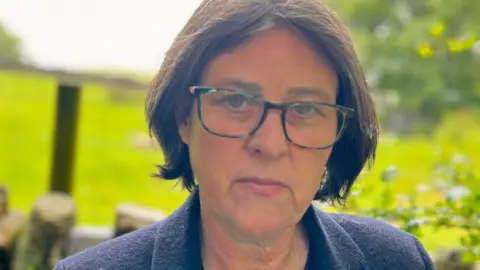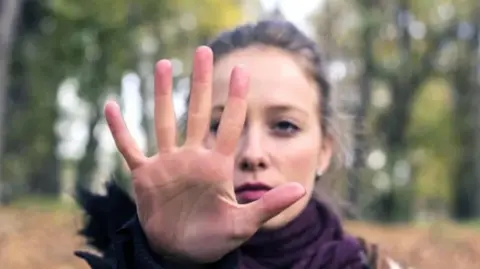
countryside offenders’ convictions still ‘woeful’
- Science
- July 13, 2024
- No Comment
- 112
 Kerry McClay
Kerry McClayVictims of domestic abuse in the countryside are still being let down by a “woeful” number of convictions five years after a report criticised the work of several rural police forces, says its author.
Former North Yorkshire police and crime commissioner Julia Mulligan said the latest figures for rural areas obtained by the BBC suggested there had been no “significant improvement in outcomes for victims and survivors”.
The response of seven rural forces was found to be “largely inadequate” in 2019.
Both police and prosecutors said they were now working hard to improve the investigation, prosecution and handling of domestic abuse in rural communities.
 Julia Mulligan
Julia MulliganIn 2019, the landmark “Captive and Controlled” report studied police responses to domestic abuse in Derbyshire, Devon and Cornwall, Dorset, Durham, Lincolnshire, North Yorkshire and Nottinghamshire.
It found the forces’ handling of domestic abuse in the countryside – where victims are often more isolated and abuse can go on 25% longer than in urban areas as a result – was “largely inadequate”.
Five years on and Freedom of Information figures obtained by the BBC show the number of offences reported to the seven forces has gone up by 15% compared with the year of the report.
But, while there were more than 107,900 reports of domestic abuse between 1 April 2023 and 31 March 2024, the number of successful convictions is significantly lower than the number of offences reported.
Figures for the seven forces could only be provided for the nine months up to December 2023 but they show there were just 3,312 successful convictions.
 Getty Images
Getty ImagesSuch low conviction numbers compared to the number of reports of domestic abuse reflect the picture across the whole of England and Wales but Julia Mulligan says it is of particular concern in rural areas.
Mrs Mulligan said the BBC’s figures “do not suggest any significant improvement in outcomes for victims and survivors” in rural areas since her findings in July 2019.
She told the BBC: “Conviction rates are woeful. This is of concern for all victims, but those suffering in rural communities are on average subject to abuse for longer.”
The Crown Prosecution Service (CPS) say they can only prosecute domestic abuse cases that are referred to them by the police.
In the nine months up to December 2023, 5,546 domestic abuse suspects had been referred from the seven forces to the CPS; 60% of those cases resulted in successful convictions.
“When a case is referred by officers to us for a charging decision, the data shows most will result in a prosecution and conviction,” the spokesman said.
“We know the overall number of prosecutions is still too low and have been working constructively with police to improve the investigation, prosecution and handling of domestic abuse.”
Some of those police forces told the BBC that there were now more options available to stop domestic abuse, including civil court orders, Clare’s Law disclosures to tell potential victims about their partner’s violent past and local support services.
But one abuse survivor told the BBC she feared a lack of police resources and training – together with the stresses facing farmers today – would see more victims left trapped in often isolated rural communities.
Mother-of-three Kerry McClay, 49, who lives in a village in the Derbyshire Dales, survived months of mental, emotional and physical abuse by her husband, Kevin Wigley.
That culminated with him trying to kill her by hitting her in the head with an axe before taking his own life in 2013.
The couple had run a farm together but problems including bad weather and bovine TB outbreaks pushed her husband to breaking point.
 Getty Images
Getty ImagesShe fears the issues facing farmers today – from months of bad weather and flooding to high fuel, feed and fertilizer costs – could see others struggle with their mental health and take it out on their partners and families.
“My husband didn’t hit me or verbally abuse me for the majority of our marriage,” she told the BBC.
“But because of the stresses that come with farming and the solitude that comes with it, he just had a breakdown and that was the result of it.
“I do worry that there is a lot of stress on farmers today and in the farming environment that weighs down on a farmer. They start snapping at their partners and it gets worse with the more stress that’s on them.”
The 2019 report also called on rural police forces to recruit more female police officers to support victims.
The representation of women in the rural forces has improved: the BBC found that last year female officers, on average, made up around 38% of officers in those areas, up from 32% in 2019.
Across all forces in England and Wales, the figure is 34.7%.
Rural crime strategy
Mrs McClay said she hoped more women would be recruited by rural police forces, both as first response officers and visible “village bobbies”.
“They need more female officers certainly on the first interviews they do with victims. They have to be sensitive,” she said.
“I can only go from my own experience that two male police officers came and took me away to interview me and I did feel very, very uncomfortable.”
Meanwhile, Mrs Mulligan called on the National Rural Crime Network (NRCN) to review progress made since the 2019 report, which was based in part on 67 in-depth interviews with people who had experienced domestic abuse.
A spokesman for the NRCN said it would be commissioning further research to see if recommendations from the report had been implemented by the police.
He added: “These latest statistics show there is still much to be done in tackling this issue.”
The CPS said it is currently working with the National Police Chiefs’ Council (NPCC) to develop a national Domestic Abuse Joint Justice Plan to improve how such offences are dealt with.
A spokesman for the NPCC said: “Policing alone doesn’t hold all the answers and preventing tragedies requires a whole system response, with improvements needed across the public sector.”
A Home Office spokesman said the new government intended to halve levels of violence against women and girls within a decade and introduce a “cross-government rural crime strategy to tackle crimes blighting rural areas”.
#countryside #offenders #convictions #woeful










